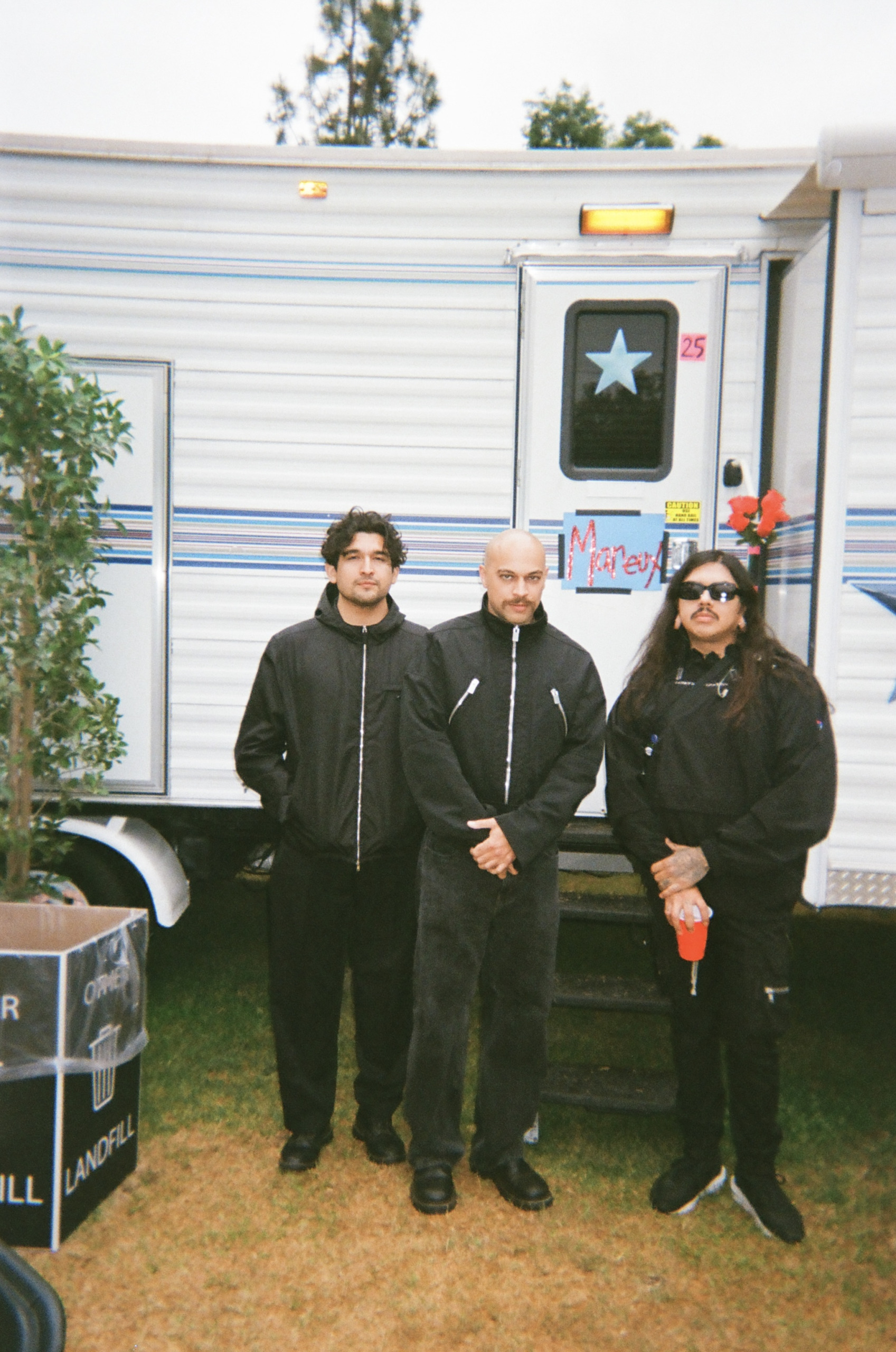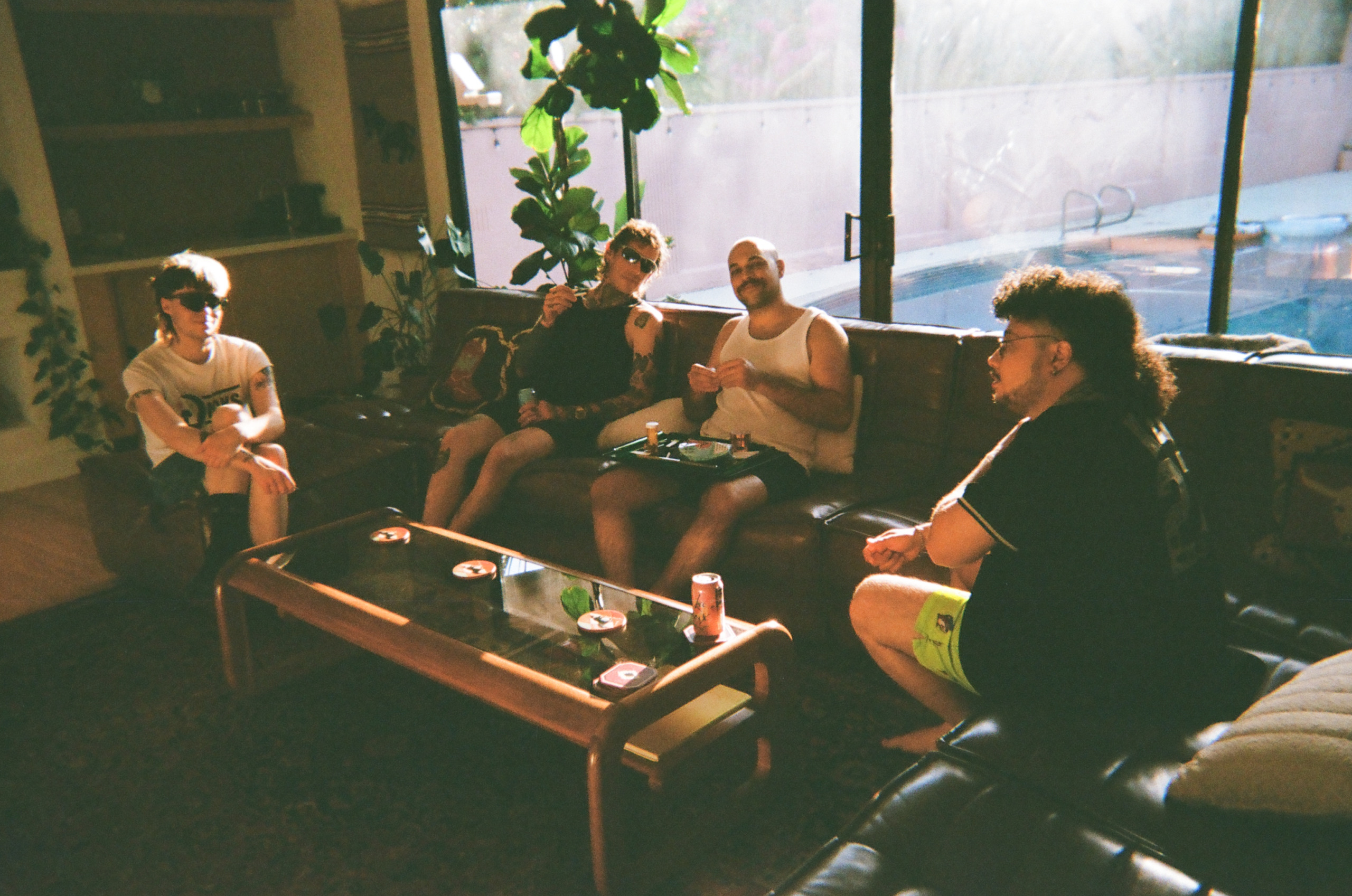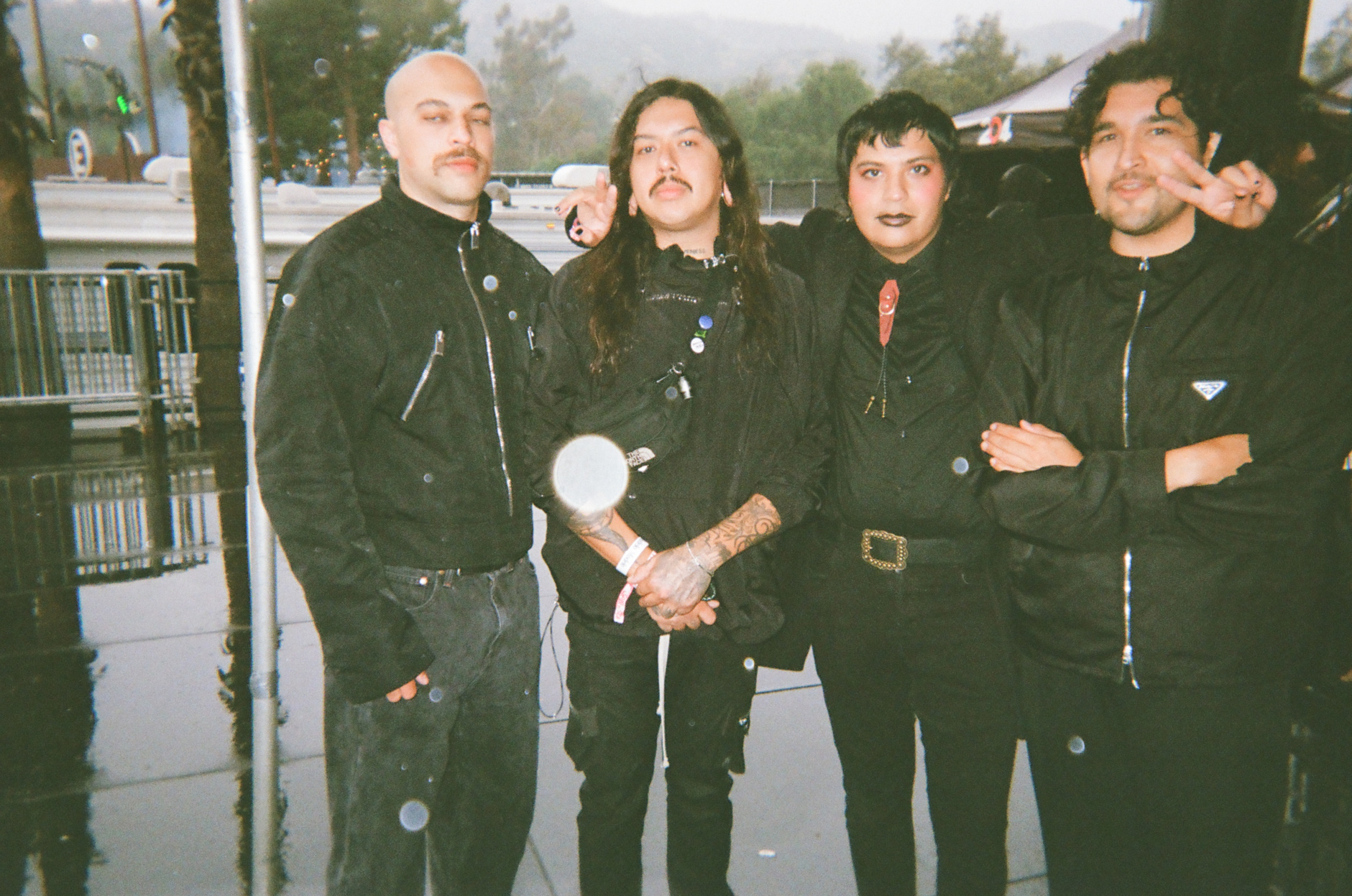This is Tour Diary, where artists give us a behind-the-scenes look at life on the road.
“I only care about one thing,” Mareux says, “and that’s being in love.”
In 2021, Aryan Ashtiani went viral. For the LA-based artist, who works under the moniker Mareux, it came as a surprise — his cover of the Cure’s “The Perfect Girl” was soon charting, a song he’d recorded in 2015, the same year he’d decided to give up music in favor of a career in healthcare. By 2023, he was on the Coachella bill and releasing a debut album, Lovers From the Past, via Warner Records.
Read more: Fan poll: 5 best goth bands of all time
Mareux has been dubbed “Darkwave Prince,” and given his flowers as a goth-to-watch. Well deservedly. His music is steeped in romance, recalling Clan of Xymox’s eerie ballads — songs like “Louise” — and the longing, deliberate heartbeat baked into Depeche Mode’s Music for the Masses. But nostalgia doesn’t carry Mareux’s soundscape. Driven by a dance-pop air and inspired by bands like TR/ST, his work has placed him squarely in the contemporary scene while defining its own personality.
In Mareux’s hierarchy of needs, emotion, energy, and mood come first. Not unlike most things under the “goth” umbrella. This was evidenced by his charged debut, an urgent and melancholic ode full of yearning, that could be played in the club as easily as it could be cried along to from the shadows.

While some buckle under the pressure of a sophomore project, Mareux has clearly been poised and ready. From Lovers From the Past to Nonstop Romance, Mareux pens his tracks like love letters sent back and forth, accruing intensity and flavor as time goes on. Sensual, sinister, drawing heavily on desire, the new project sees the artist lean all his musical weight into love, creating a distortion-heavy soundtrack to the feeling itself that will gut you to your core.
Leaving the edges rough, the album is a dense and confessional take on darkwave that feels incredibly personal — here, we see Mareux coming into himself more than ever as an artist, as much as a human, with hot, sticky blood pumping. The project is choppy in beautiful ways, thudding, fuzzing in and out of understanding, fueled by synths that feel cut and sewn together, creating a perfectly asymmetrical, powerfully heartfelt collage of unlikely club sounds. “I like when music sounds like found footage,” the artist explains. And in true darkwave fashion, the album has achieved something exceptionally cinematic, in its relation of romance as much as its sonic exploration. While writing the album in his Lincoln Heights bedroom, Mareux watched films on mute, through an old CRT TV. As the songs stewed, he drank in complex work from Andrei Tarkovsky and Alejandro Jodorowsky, in tandem with films like Belly.
We got the chance to follow Mareux around on a show day, during Pasadena’s Cruel World Festival — and to sit down with the artist, to talk about romance and submission, being an EMT, and “annoying main character people.”

You credited “Laugh Now Cry Later” as the saddest song on the album. What’s the story behind it?
Like most of my writing, it’s a conglomeration of experiences, personal and not. Luckily, I’m in an awesome and happy relationship, so feeling like a sad boy doesn’t come as naturally these days. Still, I wanted to capture the feeling of being in a relationship where, despite how much assurance you receive, you can still feel the other person detaching from you. I said it’s the “saddest song on the record” because everything else on Nonstop Romance is just so much more upbeat and loose. “Laugh Now Cry Later” is reminiscent of older Mareux, and I thought it was important for fans to throw on a track that recalls that moment in time.
What other themes, feelings, did you explore on the new album? How much of your work is written around personal experience?
The album is a love letter to Natalia, my girlfriend. I always wanted to make something for her that she can enjoy from start to finish. There are a lot of references to our love, from the genres I chose to explore to the titles of the tracks. Between it all, I did my best to hold up my brand of cinematic music, focusing heavily on atmosphere and the weight of each beat. I wish I had something deeper to say about this since it gets brought up so much, but my primary focus when writing is building textures and setting a scene. I’m not much of a poet, so I think most of my expression goes into building deep and emotive instrumentals.
How has your style evolved? What can people expect from the new album, sonically?
When I started in 2010, I was making bedroom synthpop and trying to be the next Jai Paul or Baths. I was pretty lax with my direction otherwise, and it wasn’t until I came across TR/ST’s self-titled debut that I was hit with my biggest jolt of inspiration. I wanted to be that guy so damn bad. Today, I’m trying to break free from the confines of the “darkwave/post-punk” labels. I don’t think I pushed it enough on the last record, although I tried with songs like “Glass” (feat. King Woman) and “Night Vision.” I have love for darkwave and post-punk, but it’s gotten to a point today where everything is so stale and cookie-cutter that bands need to try and experiment to push those genres along. Nobody wants to hear your band that sounds like the Cure or Joy Division. They can just go listen to the Cure and Joy Division. I’m trying to incorporate more styles like techno, Eurodance, Italo-disco, and synthpop while maintaining the integrity of my personal style. The great thing about Nonstop Romance is that every song sounds different. I wanted there to be something for everyone.

Your music has created a space where love and darkness can coexist. Sexuality and somberness feel like well-suited partners. What draws you to dichotomy — and how does it show up in the new album?
I’m a soft, sentimental sucker. For better or worse, I’ve always been drawn to people with tragic pasts and unconventional personalities. Being hot alone doesn’t cut it. Nothing unsexier than being totally normal, regulated, and happy all the time. I’m sure there’s an explanation for it stemming from my childhood, but it’s probably not a story we haven’t all heard. In the new album, you get that same “sad in the club” type of feeling. Sometimes the lyrics are somber, but the beat is bright, and sometimes it’s the other way around. It’s nice when the music has that kind of twist. I instantly think of “Blue” by Eiffel 65.
You wrote and recorded this in your bedroom. Can you talk about that process and why you approached the album that way? What does that environment give you?
I played upright bass in middle and high school, and outside of that, I have no other musical training. To make matters worse, I use FL Studio as my DAW of choice. This instantly makes me useless in a professional studio. However, in my bedroom, with everything set up the way I like it, I can instantly get to work and create cool shit. That said, it’s not really out of choice but necessity that I work and record albums this way. I have to do it alone. I’m too neurotic and a control freak to do anything else. I need absolute freedom.
Your work is so visual and immersive — were there any references you drew on outside of the auditory realm? Art, life, etc.?
I have a film background, so I’m always pulling references from movies. On this album, I had a 13-inch CRT TV on my desk that I fed DVDs into while writing. I forget exactly what I was watching, but it was things like Belly, Casino, Cape Fear, Fire Walk With Me, and also maybe The Mummy (1999).

Is there any alter ego element to Mareux?
I throw in a little more intensity with Mareux. But in all honesty, I try to do this thing without a gimmick. For example, on IG I try to be cool and curated, but on TikTok I look like a 46-year-old DoorDasher from Iran.
Since you started out making music, what have you learned in the process? Personally, professionally, spiritually — or otherwise.
For years my music was only available on SoundCloud because I think it absolutely sucked and no one would listen to this shit. I even kept it from friends and family up until around 2020 because I thought it was super embarrassing to make music. It took convincing from my friend and now current manager, Miguel, to have the confidence to distribute it and push it as a career. So, ultimately, what I learned is that I have bad taste.
When we think of emotional music, the association is often sad or angry. The spectrum of feelings in your work — and those your work allows listeners to have — feels broader, even when the instrumentation leans gothic or gloomy. Do you feel like this is true? How do you achieve that?
I think a lot of it comes from my two-step writing process. I almost always write the instrumental first, and then follow it up with the lyrics. Maybe I was in a mood when I was doing the first beat, and it cleared up by the time I wrote the lyrics. Maybe I had a change of heart, or fell in love, or something else grabbed my attention. It might just be a byproduct of this way of songwriting. I never really know what I’m going for when I make a song. I tend to switch things up so much throughout writing that by the end, it’s all a surprise even to me.

What’s your relationship to words like “revival” and “nostalgia” that are thrown around so often in music these days?
If you’re using vintage instruments, then there’s no escaping the revival and nostalgia allegations. I was born in 1992, just as producers started switching from synthesizers to ROMplers. The soundscapes changed, and things got increasingly digitized, and I feel like I missed out on an era that was so incredibly awesome. I’m not alone in this feeling. This whole generation of producers reveres vintage synthesizers that were thought of as worthless or old-fashioned just a couple of decades ago.
What about your music makes it inherently Mareux?
I really think it’s the richness of the instrumentals that appeals to listeners. I get pissed off at myself when I make something that feels derivative or lazy. It’s my problem with so much music today. I pour hundreds of hours into my tracks to make sure they have something compelling to them. I want a person to listen and feel like it’s the soundtrack to their life. My dream is that annoying main character energy people listen to Mareux.
You were previously working toward being a physician and found this other route to becoming the true creative force you are today — what’s that been like? How did that decision happen, and where, if at all, do those two paths and goals overlap?
I had no hope of ever making a living from being a musician, and I didn’t have a trust fund, so I had to hustle out there to make ends meet. I was a medical assistant, then an EMT, then in a master’s program to be a physician assistant. I was in the middle of clinical rotations when my song blew up, and I had to leave it all behind. It was an awesome experience and really gave me the sense that I actually worked in life to deserve a moment like this, so I’m not even mad about the $60,000 in student debt I’ve accrued for nothing.

I have to admit, your music got me through a really intense period post-breakup. It was empowering in its own paradoxical way. What do you listen to when you’re going through it — and/or when you need a mood boost?
You’re very sweet for saying that. Thank you. Today I listen to a lot of Eurodance and nü metal when I feel like throwing on something to shift my mood. Gigi D’Agostino, Korn, Limp Bizkit, Eiffel 65, and sometimes Charlie Feathers.
Who are you listening to these days?
Mostly country and rockabilly at home because our house is a cool mid-century ranch style home with southwestern decor, and it all ties in real nice.
What is the best film you’ve watched in the last year?
I loved Hard Eight. Great performance from the cast, especially John C. Reilly, who is one of my favorite actors. I love a good degenerate film.

When was the last time you laughed until you cried?
I think with my friend Nick Kreiss. He’s an uber-talented comedy writer, and he does incredible impressions. Some of the shit he says makes me laugh and pee.
Are you spiritual?
Definitely. I believe in God and spirits and ghosts, and I think everything is foretold.
What does “romance” mean to you?
Complete submission to another person. Not in a weird sexual way or anything. I keep things so vanilla. Just in the sense that you make your life’s entire mission their happiness and fulfillment.


